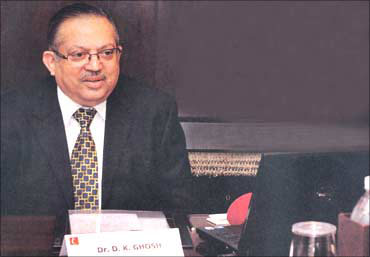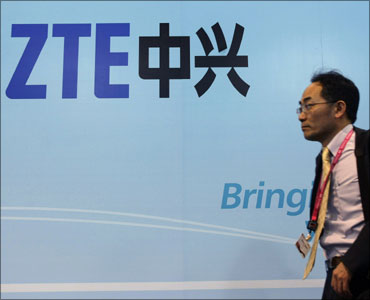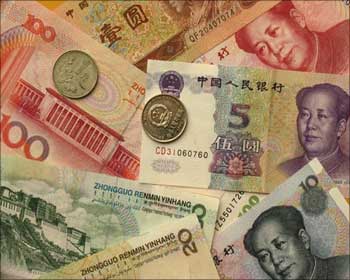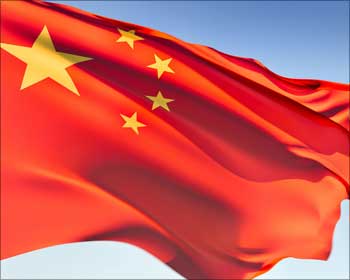Photographs: Courtesy, Business Standard Kanika Datta
When telecom equipment maker ZTE first set base in India in 1999, it faced a problem common to Chinese companies: The general suspicion that their business practices were somehow devious and their 'cheap' products flawed.
A decade later, this little-known Shenzhen-headquartered company, which operates in a highly price- and technology-competitive market, has moved up from being India's tenth-largest player to the fifth-largest (Ericsson, Nokia, Nokia-Siemens and Huawei precede it).
It accounts for the lion's share of CDMA networks run by state-owned BSNL, Reliance Communications and Tata Teleservices, and, in the past year and a half, has bagged orders from several of the new licencees. So much so that India has become ZTE's largest overseas market.
How did ZTE overcome the odds to establish itself in a market in which strong biases persist? D K Ghosh, chairman and managing director of ZTE India since 2006, says the solutions lay in addressing cultural issues as much as realigning business practices.
Mind your language
For Chinese companies globally, language is inevitably a big barrier and the toughest to overcome. China is one of the world's most linguistically isolated countries, making it difficult for people to pick up Mandarin easily.
The fact that few Chinese executives spoke English, the global language of business, increased the scope for misunderstanding. This was the issue Ghosh says he tackled first.
. . .
How Chinese firm ZTE made it big in India
Image: D K Ghosh, chairman and managing director of ZTE India.Photographs: Courtesy, Business Standard
"The cultural gap has been a big problem for us and I knew I had to take steps to bridge this. One of the things I did was to alter the format of our senior management meetings," Ghosh says.
Typically, meetings that were held to discuss Indian operations were attended by senior Indian managers and Chinese executives from headquarters. "From the outset I found that these meetings would be conducted in Chinese -- which none of the Indians understood! So I stopped proceedings and appointed an English interpreter from among the senior executives," he explains.
In the absence of this, there was a clear wall between the Indians and the Chinese -- not least of which was the lingering suspicion that the Chinese executives actually knew English but pretended not to understand to suit the situation.
Once the presence of an interpreter became standard practice at ZTE's India meetings, these misgivings abated. "It was a simple solution but it proved far-reaching because a lot of key information would have been lost if the meetings had been conducted in Chinese only," Ghosh adds.
Trust exercises
Multinationals in general tend to appoint their "own" people to senior positions in companies they set up overseas and Chinese companies are no different.
Given the language barriers, however, this practice also heightens the potential for misunderstanding. For India, however, ZTE made an exception, introducing the concept of trusted managers, a model it eventually replicated worldwide.
. . .
How Chinese firm ZTE made it big in India
Photographs: Reuters
ZTE found that the concept of training trusted managers for the India operations was possible because Indians have a wide breadth and flexibility of knowledge (in terms of technical competence/software and so on).
Therefore, the thinking went, if Indians could be trained to be international managers and technical experts, it would help ZTE in its global sales effort. To start with, 300 Indians with two or three years' experience were hired and relocated after short local orientation to China where they were given intense training across disciplines for almost a year.
Candidates were then screened based on their specialisation and individual competence and relocated to different departments in India.
"This marked a major change; earlier the Chinese management could not trust anyone local with classified information," says Ghosh. "Now, for the first time in the world, these Indians would be the nucleus of a trusted core team." Today, of the 2,000-odd employees in ZTE India, 86 per cent are Indian.
Now, just under a year later, the model is being expanded and consolidated -- more people are being selected from India, Bangladesh and so on, and the model is being replicated in Europe where ZTE has hired Europeans to be trained in China.
Meanwhile, says Ghosh, there have been lots of experiments to improve relationships across nationalities. "One has to do with recognition -- we have been rewarding locals with more than average performance with a lot of pomp and show."
. . .
How Chinese firm ZTE made it big in India
Don't 'buy incompetence'
Managing the external environment in terms of customer perception is also critical to overcoming reputation problems. In ZTE's case, this required altering familiar but less savoury business development practices and realigning the sales pitch to allay customer fears.
One of ZTE's biggest critics in the initial days was state-owned BSNL. Dissatisfied with its equipment and service, "they were almost throwing things at us," says Ghosh.
"In this connection, one of the common practices was that of passing gifts under the table to get business. I put a stop to that," he adds. The focus, instead, was placed on project execution.
Obviously, there was a rebound of sorts for some time but things settled down after that because, as Ghosh points out, "people now had to deliver instead of buying incompetence".
Now, ZTE equipment accounts for 85 per cent of BSNL's CDMA network.
At the same time, Ghosh says he also stopped the practice of sending out a "football team" on customer calls -- another common Chinese business custom -- because it made them uncomfortable.
. . .
How Chinese firm ZTE made it big in India
"As a result, perceptions gradually improved because our executives established personal links," he adds.
Tying in with this, of course, was the quality issue. As Ghosh points out, this was essentially a "state of mind" and the cumulative effect of working with customers gradually helped establish ZTE's reputation as a technology-leader (for instance, it is the leading provider of NGN, a fixed-line 3G network product).
Meanwhile, ZTE also focused on customer needs. For instance, one of the major issues with new telecom licensees was the shortage of finance.
"Chinese banks are flush with funds, so we were able to organise $4 billion to $5 billion for Indian operators to set up their networks," says Ghosh. "Most of these projects would have not have taken off if it hadn't been for this," he adds.
Of course, prejudices and "security concerns" remain -- a fact that Chinese companies will have to learn to live with. Ghosh provides a recent example when a ZTE team comprising Chinese and Indian technical experts was conducting some testing work in a public thoroughfare.
"Our Chinese experts were working feverishly and this immediately aroused the suspicion of a shopkeeper who phoned the police complaining that they were spies and so on," he says. The police arrested everyone but they were soon freed after ZTE we explained the issue. "But the incident goes to show that this kind of distrust remains and there isn't much we can do about it," says Ghosh.







article